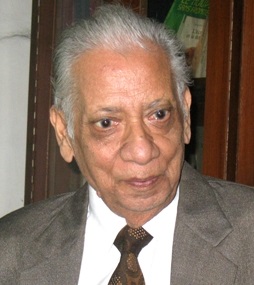
Ajit Barua was among the few literary people in 1940s who gained recognition in the world of modern Assamese poetry. Ajit was born in 19th August 1926 at Guwahati to Chitramalla and Padmalata Barua. After completing is
schooling from Cotton Collegiate School securing third position in the board exams in 1943, Barua completed his BA honours in English from Cotton College in 1947. Thereafter, he further pursued his studies and completed
his Masters in English from Calcutta (Kolkata) University in 1949.
One of the pioneers of modern Assamese poetry, some of Barua’s best poems include ‘Tikha’, ‘Haturi’, ‘Man Kuawli Samay’, ‘Dukhor Kabita’, ‘Aeyor
Tomar Argha’, ‘Xenar Paarot’, etc. Besides, poems like ‘Jengrai 1963’, ‘Brahmaputra’, Shabdo Shongbaidya’ and ‘Shorno Chompa’ etc. are some of Barua’s remarkable work as a poet. Barua’s dedication towards writing poetry
from 1940s till recent past, an indepth and elaborate study on the life and work of famous English poet T S Eliot and an untiring effort to understand the theoretical and aesthetic aspects of English and French poetry
make him a unique literary personality among his contemporaries.
An IAS officer, Barua served the Assam govt in various positions before retiring in 1986 as Commissioner in lower Assam. Till then Barua had
a sole book published under his credit titled “Kichuman Padda Aaru Gaan” published in 1982. In the following two decades, i. e from 1983- 2002 besides translating various songs and poems, Barua has published 20 analytical
books on literature. Besides, Barua wrote one novel and five books on poetry. Apart from Assamese and English, Barua has elaborately studied various literary works on Bangla, French, Hindi and Sanskrit languages.
Barua has written preface of his published Bengali poetry books like ‘Brahmaputra’, ‘Schizophrenia’, etc. and has also written an article titled ‘Ramtanu Lahiri and Contemporary Bengali Society’ for the first edition
of an erstwhile Bengali daily ‘Samay Prabah’. For his illustrious career in literary work, Barua has been awarded with several honours which includes Bharatiya Bhasha Parishad Puraskar in 1988, Assam Sahiyta Sabha’s
Award in 1993, Williamson Magor’s Education Trust instituted Assam Valley Literary Award in 1999 and Assam govt. instituted Kabi Ganesh Garg Award in 2010.
Ajit Barua left for heavenly abode on 3rd April 2015.
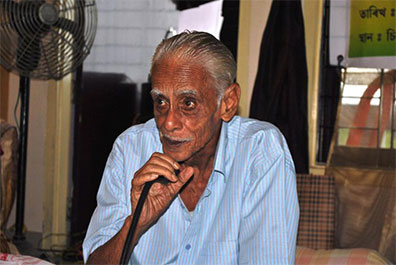
Inspite of being a veteran, Hiren Bhattacharyya is one of the most popular Assamese poets of the present day. A poet, author, singer and artist –Hiren is a versatile genius. Hiren Bhattacharyya is a personality who can
be rightly termed as a perfect example of someone who is complex in quality but simple in nature. His humility makes him deeply rooted and shared an intimate bond with his acquaintances and friends who fondly called
him Hiru Da. Besides, in Assamese literature, he is also known as ‘Prem Aru Rodalir Kobi’ meaning Poet of Love and Sunshine. Hiren was born in Guwahati on 28th July 1932 to Tirthanath and Snehalata Bhattacharyya. He
spent his childhood in Jorhat, Dibrugarh, Golaghat and Tejpur. He did his schooling from Cotton Collegiate School and passed out in 1949. He did not have a formal college education and had to stop his studies after
completing his higher secondary from B Barua College Guwahati.
In the 50s he joined the Bharatiya Gananatya Sangh and was active in Guwahati Shakha. Besides he also became a member of the Communist Party. He
also worked as a teacher in a school in village and later worked in various press. He was also a regular lyricist in Guwahati Akashwani.
Though Hiren started writing in late 50s, his first collection of poems
titled ‘Mor Desh Mor Premer Kobita’ was published in 1972. Besides Assamese, Hiren was well versed in Bengali language too and has four books on Bengali poems to his credit talking the tally of total books published
in his poems to 18. Some of the remarkable books on his poems are ‘Kobitar Rod’ (1976), ‘Xugondhi Pokhila’ (1981), ‘Shoichor Pothar Manuh’ (1991), ‘Jonaki Mon O Onyano’ (Bengali, 1991), ‘Mur Priyo Bornomala’ (1996),
‘Bhalpowar Dikcou Batere’ (1996), ‘Bhalpowar Buka Mati’ (1996), ‘Sipar Pora Patalouke’ (2009), ‘Brishti Pore Ojhore’ (Bengali, 2011)
Hiren, in view of his remarkable contribution to Assamese and Bengali literature,
has been awarded with several awards which includes Assam Sahitya Sabha instituted Ragunath Choudhuri Puraskar in 1976 and Vishnu Radha Puraskar in 1985 for his poem ‘Vivanna Dinor Kabita’ and ‘Xugondhi Pokhila’ for
which he was also awarded with Bharatiya Vidya instituted Bhawan Rajaji Sahitya Puraskar the same year. He was also awarded with Soviet Desh Nehru Puraskar for the same book in 1987. He was also awarded Sahitya Akademi
Puraskar in 1992 for ‘Shoichor Pathar Manuh’ and was also awarded with Bharatiya Bhasha Parishad instituted Bajalini Puraskar in 1993. Besides, he also received Williamson Magor’s Education Trust instituted Assam Valley
Literary Award in 2000 and Assam Govt instituted Ganesh Garg Puraskar in 2010. Besides, he was also honoured by Uttar Pradesh Hindi Sansthan.
Hiren Bhattacharyya left for heavenly abode on 4th July 2012 just
three months after receiving the Pandit Vidyabinod Memorial Award.
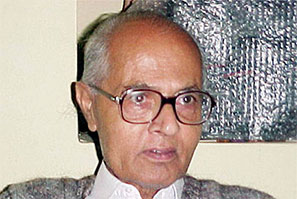
Known as ‘Jibanananda Das’ of Assamese literature, Nilamoni Phukan is one of the best liberal poets of Assamese language. Besides, he has also gained fame as a skilled artist and a witty critic.
Nilamoni was born
to Kirtinath Phukan and Bordabala Devi in Dergaon, Upper Assam on 10th September 1933. After completing his matriculation from Dergaon High School, he took admission in Cotton College at Guwahati and finally completed
his masters from Guwahati University. He joined Arya Vidyapeeth College in Guwahati as a lecturer of History in 1964 and retired in 1992. Nilamoni is not only a society conscious poet but various contemporary issues
related to state and country are reflected in his poems. Besides, his indepth study of world literature also has a deep influence in his writings. Nilamoni’s first collection of poems ‘Surjo Heno Naami Aahe Ei Nodiyedi’
was published by Rangiya’s ‘Prakashan Ghar’ in 1963. Two years later his second collection of poems ‘Nirjontar Shabo’ was published by famous Guwahati based publishing house ‘Dutta Barua’. Till now he has penned down
eight collection of poems which includes ‘Naishabd’ (1965), ‘Phuli Thaka Surjomukhi Fultur Pine’(1972), ‘Kite, Golap Aaru Kite’ (1975), Kabita (1981), Nrityarota Pritibhi (1985) and ‘Olop Aagote Aami Ki Kotha Paati
Aasilu’ (2003).
He has three collection of selected poems including ‘Golapi Jaamur Lagna’ (Bani Prakash, Guwahati, 1977), ‘Saagartalir Shankha’ (edited by Dr. Hiren Gohai, Lawyer’s Book Stall, Guwahati, 1994)
and ‘Nilmoni Phukan : Sampurna Kabita’ (Artharth, Guwahati, 2006)
Some of his works have been translated in Bengali which includes ‘Nirbachita Kabita: Nilmoni Phukan’ (Translated by Tarit Choudhuri, Sahitya
Academi Kolkata, 2004), ‘Padosi Golap: Nilmoni Phukan er Kabita’ (Translated by Ramanath Bhattacharya, Papirus, Kolkata 2007) and ‘Nilmoni Phukan er Kabita’ (Translated by Rabindra Sarkar, Pratibhas, Kolkata, 2007).
His poems have also been translated in English in a book titled ‘Selected Poems: Nilmoni Phukan’ in 2007 by Krishnadulal Barua, Sahitya Academy, New Delhi.
The books written on artists or about artists in Assamese
includes ‘Lok Kalpadrishti’ (1987), ‘Roop Barna Baak’ (1988), ‘Shilpokala Darshan’ (1998) and ‘Shilpokalar Upalabdi Aaru Anando’ (2012).
Nilamoni Phukan for his outstanding contribution to Assamese literature
has received several awards including Assam Sahitya Sabha instituted Raghunath Choudhuri Puraskar (1972), Assam Prakashan Parishad Puraskar (1977), Sahitya Academy Puraskar ( 1981), Jagadhatri Harmohan Puraskar (1988),
Assam Sahitya Sabha instituted ‘Chaganlal Jain Puraskar (1991), Kamalkular Foundation’s ‘Kamalkumari Jaatiyo Puraskar’ (1994), Williamson Magor instituted ‘Assam Valley Literary Award’ (1998), Bharatiyo Bhasha Parishad
Puraskar (Kolkata, 2000), Joshua Sahitya Puraskaram (Hyderabad, 2001), Gangadhar Meher Jatiyo Puraskar (Sambhalpur University, Odisha, 2002). Phukan also received the coveted Padmashri in 1990. Besides, he was also
a respected member of New Delhi’s Human Resource Development Department from 1999-2001 and was also a ‘fellow’ of Sahitya Academy.
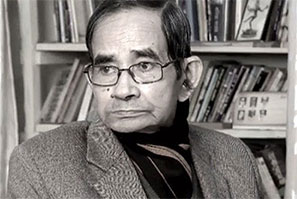
If Nilamoni Phukan is referred as ‘Jibanananda Das’ of Assamese poetic world, then Hirendranath Dutta can undoubtedly called as ‘Buddhadeb Bosu’ of Assamese literature. A student of English literature Hirendrannath Dutta,
similar to Buddhadeb Bosu, was a teacher by profession in his entire life and simultaneously wrote prose, poetries, articles and essays. Hirendranath made his foray in the literary world quite late, as at the age of
44 his first collection of poems ‘Somadhir Sowarani Aru Annyanya Kavita’ was published.
Hirendranath was born on 1st March 1937 at Titabor in Jorhat district of Assam. His academic career stretched from his
schooling in Titabor to his college studies at Cotton College Guwahati where he graduated with English Honours and finally culminating at Calcutta University from where he completed his Masters degree in English literature.
In 1959, he joined as a lecturer in the department of English at Guwahati University where he later got promoted to the post of reader in 1982 and finally retired in the year 2000. Hirendranath has three collections
of poems which include ‘Somadhir Sowarani Aru Annyanya Kavita’ (1981), ‘Manuha Anukule’ (2000) and ‘Pal Anupalar Anch’ (2007). Besides, he has written several essays and critical reviews which include ‘Nirbachita Shomalosana’
(2011) and ‘Mor Prabandha’ (2014). He also edited an anthology of Assamese poetry – ‘One Hundred Years of Assamese Poetry’ (2007).
Hirendranath won the Sahitya Academy Award in 2004 for his second collection
of poems ‘Manuha Anukul’. Hirendranath does not have vast volumes of writings but whatever he has written has found appreciation among the critics for its wit and intelligence. His language and description bring a seamless
flow of visuals in the mind of the readers. His poems have widely dealt with human’s experience and memories and man’s pain and sorrow.
Hirendranath participated in ‘Kabi Bharti Kavisammelan’ held at Bhopal
in 1987. Two years later, he was elected as the President of Asam Sahitya Sabha’s Doom Dooma convention. He also participated in various poets’ conferences held in Guwahati, New Delhi, Bangalore and Calcutta by the
Sahitya Akademi.
Hirendranath left for heavenly abode on 20th February 2016.
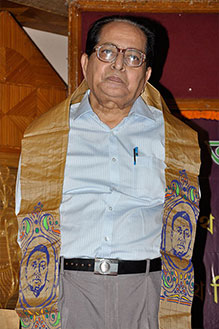
Educationist and writer Bhaben Barua was born at Janji, in the Jorhat sub-division of Sibasagar district in upper Assam on 16th February 1939. Son of Debendranath and Kanchanbala Barua, Bhaben’s primary education was in
his village school. However, he passed his matriculation from Cotton Collegiate School, Guwahati in 1956. After completing his intermediate from Jagannath Barua, Jorhat he moved on to Kolkata and successfully completed
his Bachelor’s Degree with English Honours from Scottish Church College. With an outstanding result, Bhaben got scholarship for his school and intermediate studies. He finally completed his Masters in English from Delhi
University. Bhaven started his professional career as a teacher. He worked for a year as a high school teacher, and then as a news reader for All India Radio, Delhi (1961–1963). He became a lecturer in English literature
at the Punjabi University of Patiala in 1963, and joined the Gauhati University in 1964, whence he retired as Professor of English in 2003. From 1998 to 2000 he was a fellow at the Indian Institute of Advanced Study.
Inspite of achieving all his degrees for his study in English, Bhaben showed an extraordinary skill in writing in Assamese. His skill of writing poetries in Assamese was appreciated by all which is proved by
the fact that he got a Sahitya Academy Award for his collection of poems titled ‘ Shonali Jahag’; he also received Assam Sahitya Board literary award for the same book. Some of the remarkable books written by him includes
‘Natun Prithivi’, ‘Pondharata Kabita’, ‘Baga Jui Kola Jui Aru Anyanya Kabita’, ‘Axomiya Kabita: Rupantarar Parba’, ‘Axomiya Kabita : Bivartanar Parba’, ‘Prasanga : Kabita’, ‘Prasanga : Banikanta’, ‘Prasanga : Jyotiprasad’,
‘Prasanga : Bhabendranath’, ‘Axomor Bouddhik Duravasthar Prasangat’ etc..
Apart from writing poems, Bhaben has also edited various publications which include Sanglap (Assamese), Assam Quarterly (English), Journal
of the University of Gauhati : Arts (English), Sudarshan (English), Natun Parjyayar Sanglap ( Assamese).
Bhaben is well known in Assam and also across the country as a thinker and researcher and has been invited
to various programs to deliver lectures. Some of the remarkable lectures are ‘SS Deb Centenary lecture’ in Allahabad University, ‘Mahendra Bora Memorial lecture’ in Dibrugarh University, ‘Saint Shankardev, Indian Civilization
and the Philosophy of Vaishnavism’ at Delhi university among others.
Besides, he was the only Indian to be sent by Sahitya Academy to represent India in International Conference of Poets in Eastern Europe.
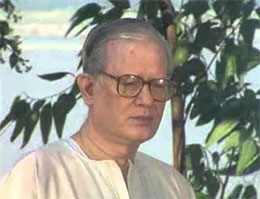
Harekrishna Deka was a former member of the Indian Police Service who has been later known for his writing. Although, he began writing poetry as a hobby while working on the police force, he later quit his job to become
a writer. He was the Director General of Police for Assam from 2000–2003. Harekrishna Deka is one of the most prominent poet-critics of his generation. He started writing poems and short stories since his student days.
He was one of the most prolific writers of Assam's Ramdhenu Era. He was awarded the Sahitya Academy Award for his poetic contribution in ‘Ann Ejan’ in 1987, and he was awarded the Katha Award for his short story, ‘Bandiyar’
(Prisoner) in 1995. After retiring as the DGP of Assam, Deka was the editor of the English daily The Sentinel for brief period, before serving as an editor of the Assamese literary monthly ‘Gariyasi’. He won the Assam
Literary Award in 2010.
Deka’s collection of poems includes ‘Swarabor’ (1972), ‘Ratir Sobhajatra’ (1978), ‘Aan Ejan’ (1986) also translated to Bengali and Oriya, ‘Bhalpoar Babe Exar’ (2003), ‘Chhanmihali Barnamala’
etc..
Besides poem, Harekrishna Deka has also written various short stories. Six of his short stories published so far include ‘Prakritik aru Anyanya’, ‘Madhusudanar Dolong’, ‘Bandiyar’, ‘Post-modern athaba Galpa’,
‘Mrityudanda’ and ‘Galpa aru Kalpa’.
Harikrishna was also well known as literary critic and has written several books like‘Adhunikatavad aru Anyanya Prabandha’, ‘Dristi aru Sristi’, ‘Nilamani Phukan: Kabi aru
Kabita’ among others. Besides, he has also written a novel ‘Aguntak’ and edited a book ‘Tarun Prajanmar Kabita’.
Besides Sahitya Academy and Katha Sahitya Awards, Dekha also got the highest award in Assamese
literature Assam Valley Literary Awards.
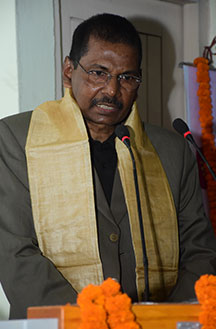
Assamese poet Sananta Taati was born in 1952 at Kalinagar tea garden at Barak Valley nearby Indo Bangladesh border in Karimkanj district of Assam. Born to Odiya tea garden worker, Sananta was brought up in nearby Ramkrishnanagar
town. He was educated in Shillong and later completed his graduation in arts from Dibrugarh University.
Sananta got closely associated with Bengali literature since his childhood and his natural love for the
language remains unblurred. His first composition was a Bengali love poem. During his youthful days in Jorhat, Sananta came in close association with Assamese language and discovered its beauty and vividness, thereby,
escalating his interest for Assamese literature and eventually decides to express his mind in the same language. Sananta is one such poet whose mother tongue is Oriya, gained education in Bengali medium and wrote in
Assamese language. Belonging to socialist ideology, Sananta played an important role by his work in generating public opinion against the political instability in Assam in 1980’s.
Sananta has collection of
13 volumes in Assamese poetry. His writing style, while on one hand, earned loved love of the readers but also gained high appreciation from the critics. His first collection ‘Ujjwal Nokhotror Hondhanat’ (In search
of bright star) was published in 1981 followed by his second collection four years after titled ‘Moye Manuhor Amol Utsav’. His other collections of poem include ‘Nijar Birudhhe Hesh Prastav’ (1990), ‘Habho Othoba Habdhahintat’
(1993), ‘Mrituyar Aagor Stopageoth’ (1996), ‘Teponito Katiyaba Bariha Aahe’ (1997), ‘Dhua Sair Hopon’ (1999), ‘Dirno Bohontor Hourab’ (2002), Aaponi Aaponar Hote Juddho Koribo Paribone?’ (2004), ‘Moi- Arthat Aami’ (2008),
‘Mor Nirabaran Attar Hokabaha Habdobor’ (2010), ‘Kailor Dinto Aamar Hobo’ (2013). In February 2017, Sananta’s 13th collection ‘Mor Priyo Hoponor Hosore Pajore’ was published followed by English translation of Sananta’s
‘Select poems’ by Divyojyoti Sharma.
Besides poet summits in SAARC nations, Sananta has also taken part in various national and international Kavi Sammelans. He has received various awards which includes Assam
Poet’s Society instituted Mrinalini Devi Goswami Puraskar in 1992, Bir Birsa Munda Puraskar in 2002, Sor Sapori Sahitya Parisha instituted Usman Ali Sadagar Samanvay Puraskar in 2011, Krantikal Samman in 2014, Assam
Sahitya Sabha instituted Nijra Kavi Shauldhar Rajkhowa Puraskar in 2015 and APPL instituted Shirish Oil Sahitya Puraskar in 2016.
Sananta retired as Deputy PF Commissioner in 2012 from the office of Tea Employees
Pension and PF Organisation under Assam govt. Post retirement, Sananta was posted as officer on special duty in the same organisation till June 2014.
Poet Samir Tanti was born in 1955 at Mikirchang in Behora tea garden at Golaghat district. He completed his 10th standard securing a 1st class from local Rajbadi High school. While underdoing his post-graduation in English
literature from Guwahati University he came in touch with stalwarts of Assamese literature including Hiren Gohain, Hirendranath Dutta and Gobindo Prasad Sarma who were his teachers.
Samir Tanti started his professional
career as an associate editor with a newspaper ‘Sadiniya Nagrik’ whose editor was renowned literary Homen Borgohain. During the same period his first poem Adhrishyotar Birudhe was published. After that Durgeshwar Dutta
started publishing Tanti’s poem regularly in his magazine ‘Panthodeep’. Before settling in his professional career, Tanti worked as a lecturer in Changsari’s Saraighat College followed by as a teacher in Khanapara’s
Ganesh Mandir Vidyalaya and then as a translator in Assam govt’s Information and Public Relation Department, and finally for a period of one and a half year as a proof reader in English newspaper ‘The Sentinel’. In
1954, he joined Assam Govt’s tourism department and finally retired as Deputy Director from the same office in 20xx.
Within this span of time, Tanti’s 13 collections of poems were published. He has written four
more books comprising of literature and critical appreciations. Besides, he has translated African poem and love songs and two collections of Japanese romantic poems and edited two compilation of short stories. Some
of his noteworthy collection of poems are ‘Juddhabhumir Kobita’ (1985), ‘Kadam Fulor Raati’ (2001), Shokakul Upatytaka (1990), Samay Shabd Sapan (1996), etc.
Tanti received the prestigious Assam Valley Literary
Award in 2012. Recipient of Chhaganlal Jain Literary Award Tanti and felicitated by West Bengal Bangla Academy, Samir Tanti participated in the first Indian poetry’s conference in Bhopal in 1987. He has also participated
in various other events related to Literature in other parts of India including Kolkata, New Delhi, Patna, Mumbai, Kochi, Bhubeneshwar, Konark among other cities.
Anubhav Tulsi is a shining-star in Assamese Poetry world. Born in 1958 at Tulakhimukh in Nagaon district, Tulsi published his first collection of poems ‘Nazma’ at the age of 27 years in 1985. The specialty of Tulsi’s work
is his vividness. While on one end, the uniqueness of his poems lies in love for life, on the other hand his work is a classic example of how regionalism can be woven around universality. His poems are an amalgamation
of imagination, myth, folklore, love and socialism.
Famous Poet and critic Sachidananda wrote about his work “Anubhav Tulsi’s poems are deep and true. It’s regional and universal. With wonderful lyrics, we can
see both present and past in his poem.”
Editor of Indian Literature A J Thomas said Anubhav Tulsi’s poem focuses our attention to the uniqueness of a person. It’s does not matter what he writes, the most important
is whatever he writes, he can extract the maximum from it.”
It won’t be exaggeration to say that Anubhav Tulsi has set a new benchmark for Assamese poetry. After publishing ‘Nazma’, he has been constantly experimenting
with the form and content of his poetry. His poems are unique examples of amalgamation of imagination with reality, pristine with modernity, village culture with urban life.
Apart from poetry, he has also edited
a few literature related magazines too. As a participant in International Poet’s Conference, he has visited various places around the world including Dhaka, Istanbul, Boston, Texas, Athens among others.
Besides
poetry, Anubhav Tulsi has a strong affinity towards films too. One of his books on film criticism has been included in University’s syllabus.
A few of Tulsi’s worth mentioning collection poems include ‘Din Raater
Duaari’, ‘Jui Chor’, ‘Jai Jaitiyo Jai’, ‘Charaier Chakhut Phulor Bichana’, ‘Paanikauri’, ‘Jibonanandor Dehantarar Drishyo’, ‘Deo Chalang’, Baruhonar Khetiyak among others.
His books as poem critic include ‘Asomiya
Kabita Aaru Tulonamulak Adhyayan’, ‘Srishti Sushma’, ‘Elorar Indrasobha’.
His story collection book includes ‘Golap Gochat Thoi Jabi’.
His books related to cinema include ‘Borno Kolpo’, ‘New Wave French
Cinema : Jean-Luc Godard’.
His edited books on collection of poems include ‘Jai Jayanti’, ‘Amulya Barua ar Kabita’, Tarun Prajanmar Kobita.
Research based journals edited by him include Confluence and
Discourse.
The recipient of numerous awards and citations, AnubhavTulasi is one of the foremost recipient of the prestigious MuninBarkataki Literary Award. While his poems are being frequently translated into English,
Hindi, Bangla, Oriya and many other Indian languages, they have also been translated into Uzbek. In 2009 some of his poems were published from Essex, U.K. in the periodical called “Kaktadua”.
A doctor by profession, Nilim Kumar has earned a remarkable recognition even as a poet. Born in 1961, he wrote his first poem at the age of 21. His poems are mainly surrealistic. In addition to poems, he has also written
novels and essays.
Besides three novels and one book of essays, Nilim Kumar has got 17 collections of poems to his credit. His poems have been translated in various languages including Hindi, Bangla, Marathi,
Gujrati, Tamil, Telugu, Kannad, Urdu, Malayalam, Odiya, Manipuri and Nepali. Besides, it has also been translated in foreign languages including French, Spanish, German and English.
‘Prostitute Moon and Other
Poems’ and ‘Sunshine Has No Home’ are Nilim Kumar’s two collections of English poems. His poems have been included in the syllabus of Bengaluru University, Guwahati University, Cotton University (Guwahati) and Dibrugarh
University.
Nilim Kumar’s two collections in Hindi were published from Kolkata’s Jadavpur University and Bhubeshwar’s Dhauli Books. His poems have been included in various other collection of poems which includes ‘Song
from the Seashore’ (Poetry from the Indian Ocean), ‘100 Indian Poets’, ‘India in Verse’, ‘Dancing Earth’, (Penguin Books), ‘Kavi Bharti’, ‘100 Great Indian Poets’, etc. Under the Indo-French Cultural Relations program,
Nilim Kumar was invited as Indian poet in French. Besides, he also visited Bangladesh and Lakshwadeep as a participant in ‘Kavisamelan’ organized by Indian Sahitya Academy. In addition to this, Nilim Kumar has also
participated in various other national and international events related to poetry which includes SAARC Poetry Festival, IORA Festival, Kerala Sahitya Utsav, OALF Festival, Kala Ghoda Art Festival, Kavi Bharti, Akashwani
organized National Kavisammelan, SAARC Writer’s Conference, Bangalore Poetry Festival, etc. Kumar has till date participated in atleast 40 Kavisammelan organized by Sahitya Academy.
Nilim Kumar has also received
several awards including Indian National Award, Destitute Leadership Awards, Raza Foundation Award, Shabd Puraskar, etc.
Nilim Kumar is the President of the ‘The Call of the Brahmaputra’ a social-cultural literary
organization of Assam. He stays with his family in Guwahati, Assam.
Anis Uz Zaman is a renowned poet based in Assam’s capital city Guwahati. His collections of poems include ‘Aggyate’ (1989), ‘Godhuli’ (1994), ‘Seujia Joon’ (1999), ‘Ai Batediei’ (2019), ‘Dukmukali’ (2014) and ‘Anis Uz zamaner
Kabita’ (in Bengali, 2010).
His ‘Nirbasita Kabita’ (first edition in 2016 and second edition in 2020) has been included as reference book for post graduation classes in Dibrugarh University. Zaman has also edited
eight books on poetry.
His edited book on poetries of Mofizuddin Ahmad Hazarika titled Prajya Sindhu Kabi Mofizuddin has also been included as reference book for post graduation classes in the Department of Assamese,
Gauhati University.
Zaman has received a number of awards and honour including Sahitya Jyoti, Kabya Hridoy, and Ekushe Sanman Honour for Poetry, Peace Friendship, Kabyarratna Writer Excellence from University
of Science and technology, Meghalaya. He has represented Assam in poets’ meet in different parts of the country and also in Thailand and Bangladesh.
Zaman was also the President of All Assam Poet Association
for two terms. His books for children include ‘Binanndia Nadir Aru Barania Charaie’, ‘Ajarar Bozarot Bejerar Puhariw’, ‘Bortukular Mel’, ‘Tumi Mur Joon Gadhulir Xun’, ‘Hathat Edin Siriakhanat’. Zaman edited books include
‘Amulya Baruah: Dristi aru Darsham’ (2015), ‘Janachetaner Kabi Ram Gogoi’ (2015), ‘Sabdaheen Barnamala’ (on poet Hiren Bhattacharjee 2016).
Zaman has jointly edited with poet Rajib Borah three other books- ‘Saat
Samudrar Chankha Bajisene Nai’ (On Poet Nilamani Phukon, 2017) ‘Khel Vonga Khel’ (On poet and lyricist Parvati Prashad Barua, 2019) and ‘Pramathes Barooah, Rajhoulir Pora Chabigrihaloi’ (on the leading film producer
and director of Indian films, 2019).
© 2017 All Rights Reserved. Design by Goyal Infotech